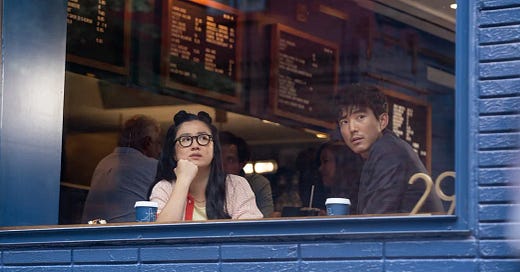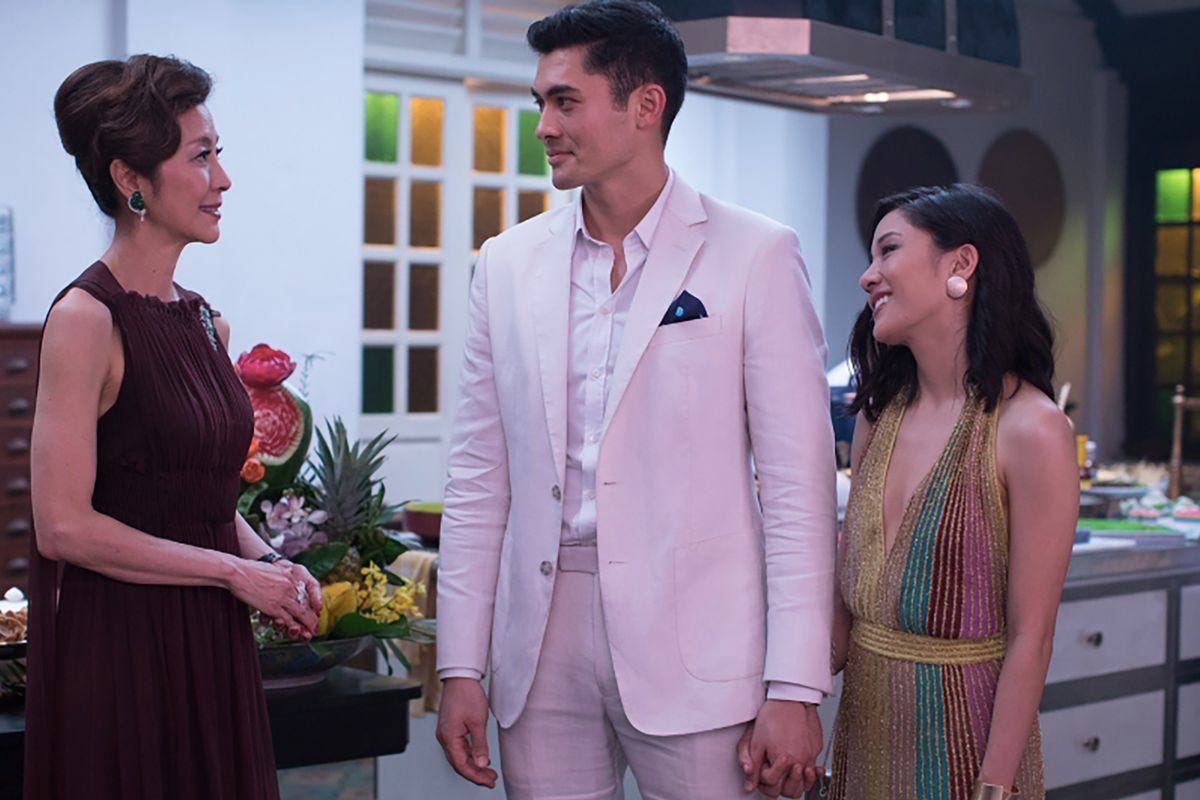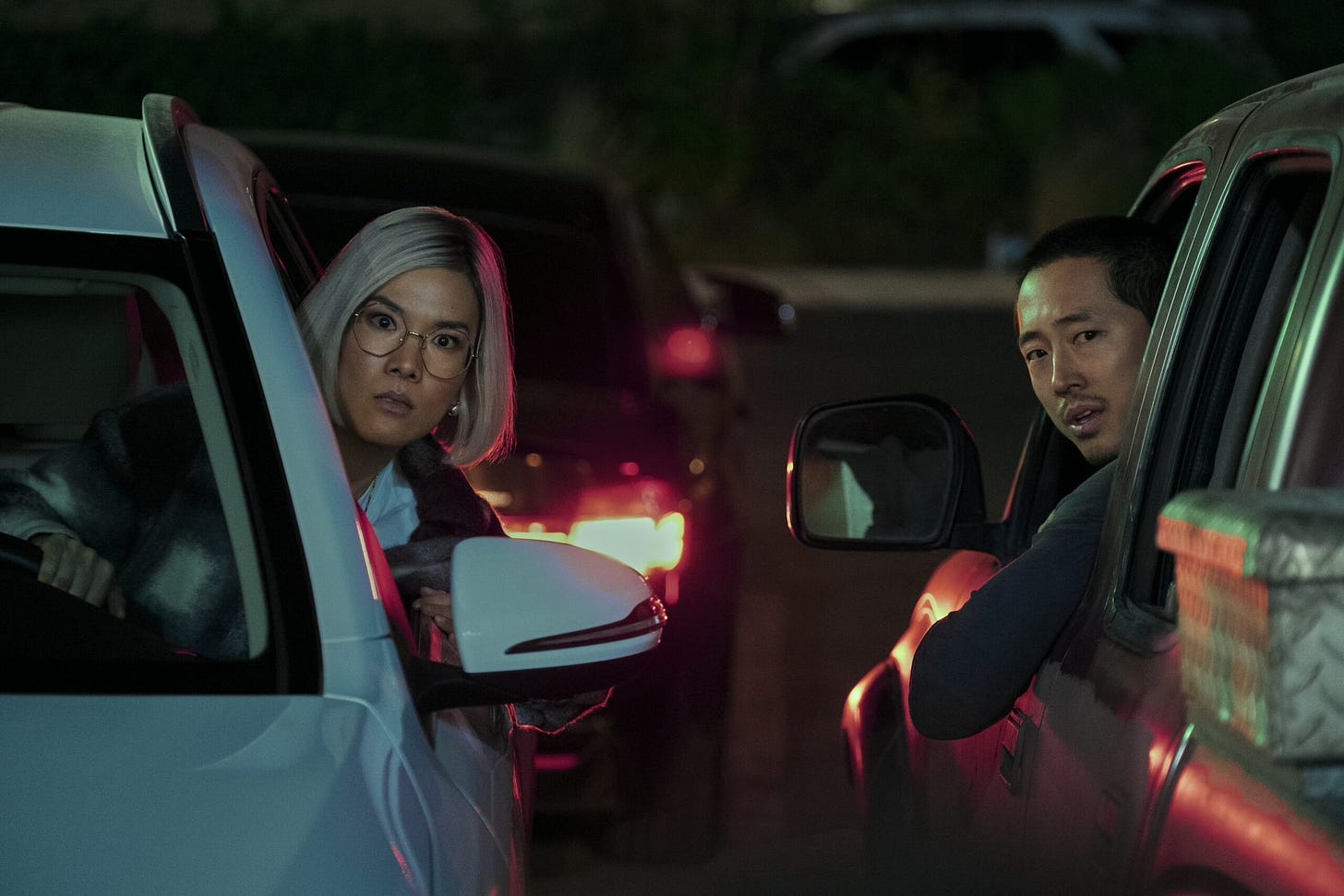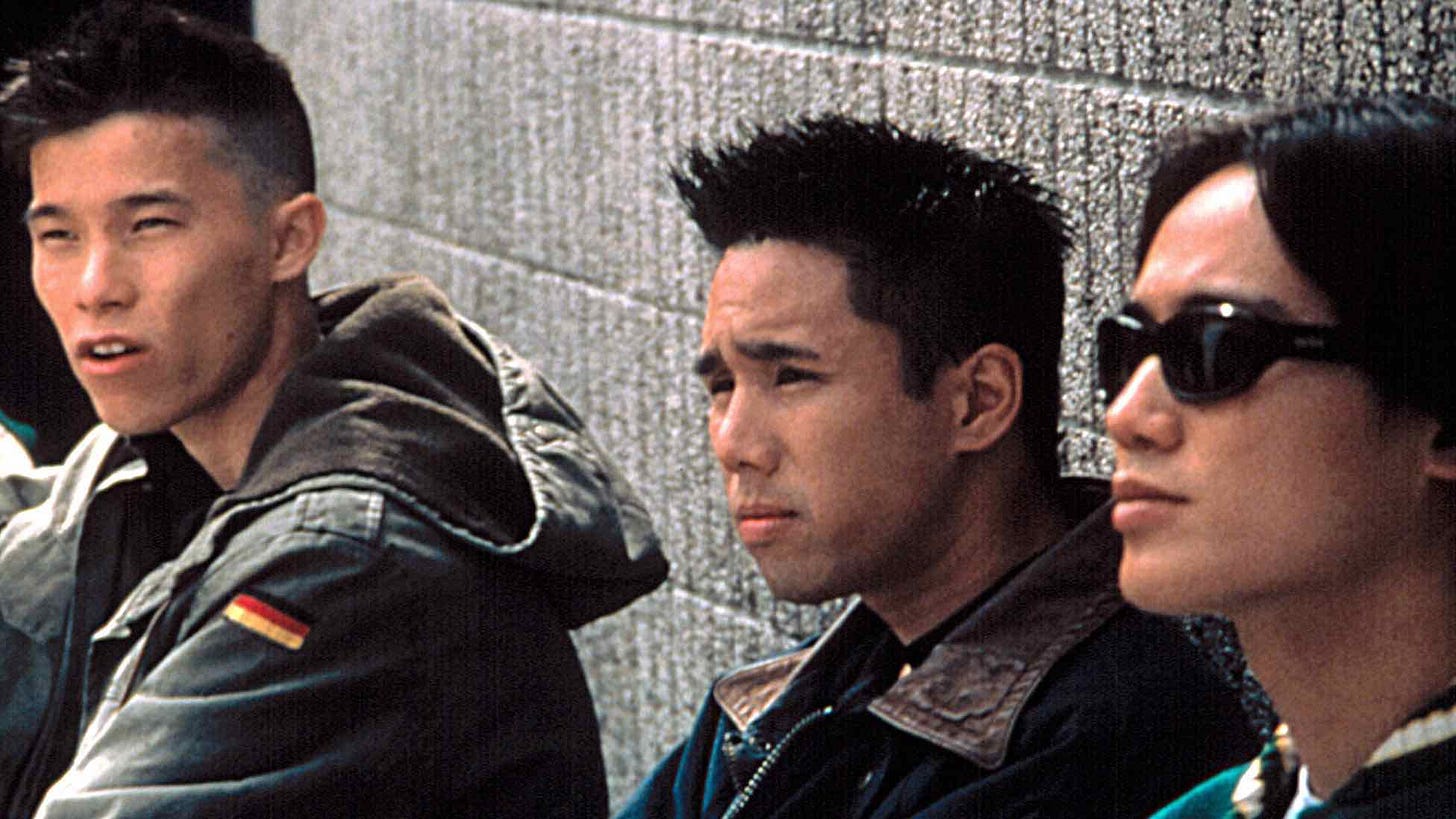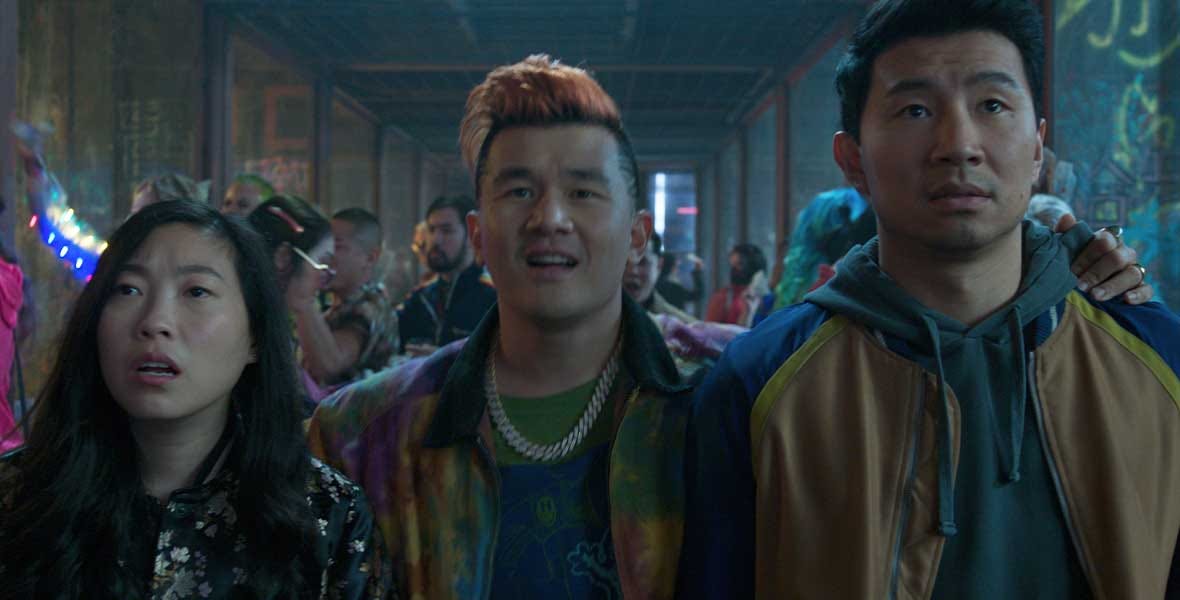The Rise of the Asian American A-Hole Onscreen
In "Shortcomings," "Beef," and more, realistically flawed protagonists challenge straightforward narratives of media representation.
Ben Tagawa is a dick. You know it from the first few minutes of “Shortcomings,” the directorial debut of actor Randall Park. Though, before you meet Ben, played by Justin H. Min, you might worry you’ve walked into the wrong screening.
Rather than the grounded indie film you’ve come to see, you see a glossy, heightened rom-com. In a scene that nearly beat-for-beat echoes the opening of “Crazy Rich Asians,” a glamorous Asian woman (Stephanie Hsu) is turned down at a fancy hotel’s reception desk, only for her husband (Ronny Chieng) to make a quick phone call and buy the hotel instead, giving the snobbish white receptionist a deserved comeuppance.
Then the credits roll. We realize, as the camera pans to a crowd, that we were watching a film-within-a-film. A film festival audience, filled with Asian faces, rises to their feet, cheering and applauding. Our protagonist, Ben, sits stone-faced. Speaking with the film’s director in the lobby moments later, he can hardly contain his distaste. His girlfriend, Miko (Ally Maki), implores him to be more positive, arguing that, even if the film wasn’t high art, it was a positive step for Asian representation in film. Ben retorts, decrying the film as “a garish mainstream rom-com that glorifies the capitalistic fantasy of vindication through wealth and materialism.”
Min’s easygoing puppy-dog charisma smooths some of his edges to give the character a degree of relatability, but ultimately, Ben is difficult to like. He’s pretentious, thin-skinned, and, as the film’s plot bears out, remarkably hypocritical, particularly when it comes to his views on gender and dating; in one pointed conversation, he lays out that he views Asian women who date white men as victims of fetishization, while Asian men who date white women are success stories to be admired.
But Ben is also extremely, recognizably real and down-to-earth. Watching “Shortcomings,” I continuously thought to myself “I know that guy.” Sometimes, shameful as it is to admit, I thought “I am that guy.” I’ll allude, as “Shortcomings” itself does, to “Crazy Rich Asians.” That film’s leads, charismatic and entertaining as they were, never so much felt like real people. They were the lovable rom-com archetypes we’ve seen time and time again, updated only in that they were now embodied by Asian actors.
Much of the talk around representation, particularly as it’s been applied to the recent rise of Asian characters in mainstream American fare, focuses on the emotional impact for viewers of seeing people “like them” on screen. While I enjoyed “Crazy Rich Asians,” and certainly thought it was nice to see a Hollywood film filled with Asian actors, I didn’t particularly see my New York-born-and-raised self in its high-rolling Singaporean setting. But “Shortcomings” is a different story. When Ben and Alice (Sherry Cola), his caustic lesbian best friend, awkwardly joke about the historic bad blood between his Japanese ancestors and her Korean ones, or the fraught landscape of interracial dating, or East Coast-West Coast rivalries? That’s the Asian America I know and love.
Of course, “Shortcomings” is not the first piece of media to take this approach. Watching the film, I was strongly reminded of “Beef,” the Netflix miniseries released this past spring which I absolutely adored. I wrote a full review of the show back in April if you’d like to read my full thoughts. But I’ll offer a recap here.
“Beef” follows a pair of protagonists: down-on-his-luck contractor Danny Cho (Steven Yeun) and up-and-coming entrepreneur Amy Lau (Ali Wong). After a road rage incident first brings the two together, Danny and Amy spiral into a growing feud and mutual obsession. While they come from different lifestyles (Danny lives a barebones working-class existence, while Amy’s day-to-day is full of lavish amenities), internally, they’re strikingly similar, both pushed to psychological snapping points by the overwhelming demands their work and personal lives have wrought them.
“Beef,” and “Shortcomings” to boot, eschew the cliches of Asian American narratives. We don’t see stories of immigrant strife, generational culture clashes, or the crises of assimilation. Instead, we see the experiences of Asian Americans from the second generation and beyond, at home in America yet still wracked with racial neuroses.
“Shortcomings” foregrounds Ben’s sense of self-awareness in artistic spaces, wary of the line between embracing his ancestral culture and commodifying or fetishizing it. In “Beef,” Danny and Amy wear themselves thin in pursuit of financial success, the American dream. These protagonists are easy to find disagreeable, but it’s also easy to understand what made them this way.
It’s this ethos, of sharp-edged storytelling that delves into the darker corners of the Asian American experience that reminds me of one of my favorite movies, 2002’s “Better Luck Tomorrow,” directed by Justin Lin and starring Parry Shen. The film tells the story of a group of overachieving Southern Californian high schoolers who find their way into petty crime as a distraction from grade-grubbing monotony.
The film isn’t about race; its all-Asian lead ensemble never faces overt racism or explicitly struggles with assimilation, generation gaps, or language barriers. But it’s all about race. It externalizes the single-minded mania of the academic pressure and “model minority” image pressed onto Asian American youth and dramatizes the dark consequences of raising a generation with no aspirations beyond a high GPA.
“Better Luck Tomorrow”’s central gaggle of teen miscreants are rough around the edges. They’re often hard to like and root for, particularly as their antisocial behavior escalates from selling cheat sheets to drug running. But, like “Shortcomings” and “Beef” two decades later, the character’s flaws are the point.
All of this brings me back to the vague yet all-important topic of representation in media. What does “good” representation mean? I’ve seen plenty of commentary that would suggest it means literally depicting characters of the represented demographic as being good, morally righteous people. But in my experience, it’s often the unlikeable, even morally dubious characters, who are more compelling and ultimately carry a greater dimensionality and realism. For film and television to only depict Asian Americans as kind and heroic wouldn’t be good representation, because that’s not what people, any kind of people, are like. Real people are messy.
Fantastical, big-budget fare like “Crazy Rich Asians” or “Shang-Chi” may remain the public faces of “Asian representation” for the foreseeable future. That’s not the end of the world. Obviously, it’s these kinds of stories that have more wide appeal, and to be fair, I like both of those movies. But, it’s these raw, smaller-scale projects that showcase more realistic Asian American experiences, warts and all, that truly, for me at least, make me feel seen.

